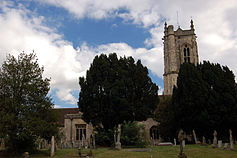Marnhull
| Marnhull | |
|---|---|
 Parish church of St Gregory |
|
| Marnhull shown within Dorset | |
| Population | 1,998 |
| OS grid reference | ST782188 |
| Civil parish |
|
| District | |
| Shire county | |
| Region | |
| Country | England |
| Sovereign state | United Kingdom |
| Police | Dorset |
| Fire | Dorset and Wiltshire |
| Ambulance | South Western |
| EU Parliament | South West England |
| UK Parliament | |
Marnhull /ˈmɑːrnəl/ is a village and civil parish in the county of Dorset in southern England. It lies in the Blackmore Vale in the North Dorset administrative district, 3 miles (4.8 km) north of the small town of Sturminster Newton. The resort towns of Bournemouth and Weymouth are approximately 30 miles (48 km) to the south. Marnhull is sited on a low ridge of Corallian limestone above the valley of the River Stour, which forms the northern and western boundaries of the parish. In the 2011 census the parish had 962 dwellings, 905 households and a population of 1,998.
Marnhull consists of several conjoined hamlets, connected by a network of minor roads. The village presents a mix of architectural styles, with post-war developments existing alongside properties dating back to Tudor times and earlier. It has three churches (Anglican, Roman Catholic and Methodist), two primary schools, two public houses, a GP surgery, a village hall and a recreation ground, as well as various small shops and services. The parish church of St Gregory has a 15th-century tower which is a landmark and has been described as "the finest in the Vale."
Saxon charters show that Marnhull existed as a village in the 10th century, although the village's site has seen human occupation as early as the Iron Age, and a Roman settlement was established at Ashley Wood in the east of the parish. The Domesday Book of 1086 does not mention Marnhull by name, though the constituent settlements of Walton Elm, Burton and Kentleworth were probably recorded under the entry for Sturminster Newton as the eight hides of land owned by Waleran, Roger and Chetel. The eastern part of Marnhull parish used to be a separate parish, named Thorton, until the 16th century. Until 1763 Marnhull was the site of an annual bull-baiting event, taking place every 3 May. The event was stopped as a response to the violence and bloodshed it engendered, not just in Marnhull but also in surrounding villages.
...
Wikipedia

